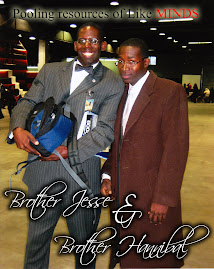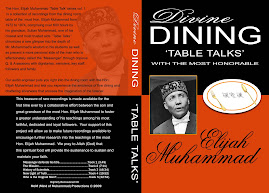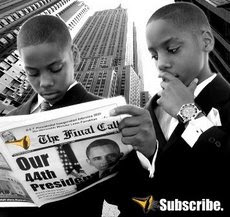In The Name of Allah, The Beneficent, The Merciful.
I am s o gracious, and grateful our dear Brother Hannibal would even think enough of me to allow me to have a spot in his blog. All praise is due to Allah for all who strive to expose, and represent to the public the truth. No matter what you claim or subscribe to, Christianity, Islam, or Judaism, the master Jesus said the truth will set you free.
o gracious, and grateful our dear Brother Hannibal would even think enough of me to allow me to have a spot in his blog. All praise is due to Allah for all who strive to expose, and represent to the public the truth. No matter what you claim or subscribe to, Christianity, Islam, or Judaism, the master Jesus said the truth will set you free.
Our dear Brother Hannibal proposed the question "From a youths perspective why is religion important, and having a spiritual foundation. I can earnestly say that from a personal perspective that religion has deeply affected my life. The teachings of the Most Honorable Elijah Muhammad have boosted me in my understanding of the very sole purpose for my very existence today.
As a young man I was chosen by almighty God Allah to partake of such powerful life reforming teachings at the very young age of 6 years old. I remember my father always playing Minister Farrakhan lectures, and as a young man I loved to quote the bible, but as I grew as a teenager, adolescent not knowing what God had in store for me. I was like Jonah in the belly of the fish running from my assignment.
I really did not know to what extent the value of what Allah had blessed me with as a youth until I saw the fruit of my choices, and the path that was before I was a pool of death. The principles my parents taught me were still embedded in me, but every person will be tested on how well they paid attention, especially when the stewards are not present.
I did some things in high school that I regret like shooting dice, fighting amongst my peers, and almost came close to deaths door, but we plan, and Allah plans, but his will subdues, and overrides are minuscule plans especially if he deems you the right material that can be used to make an outfit. I barely graduated high school. I realized that all the things my parents had been telling me were now before my eyes borrowing down on me fast. I remember sitting in my room asking Allah to forgive me for my mistakes, I began to study the teachings of the Most Honorable Elijah Muhammad for myself were I grew in understanding more thoroughly of a knowledge of self which propelled me in the direction of self love first. I invited my friends, family, etc over to watch Minister Farrakhan, and I remember shortly after a couple of weeks past then that next Sunday I stood up, and embraced Bro. Student Minister Jeffrey Muhammad, and he already knew what was in me, I grew up in the teachings, but I was like a sleeping lion just like my black contemporaries.
I do not judge our youth I strive to be humble, caring, loving, respectful, and serve them in any form or capacity. Sometimes they don't want to even talk about religion. People have been bad shepherds, and wicked husbandmen over the flock, the bible says all that came before me were thieves, and robbers. The youth are not unintelligent they might show ignorance, but most of them are plagued because of the lack of bright sincere guidance, but they know game when they see it. We expect them to function right when in reality we live in a dysfunctional society. We go into these different religious houses of worship, and people who claim or put on the garments of righteousness or backbiting, slandering, gossiping, and defaming one another. You see one Baptist Christian church then right around the corner they allow artificial barriers to inflict separation between there Methodist Christian family, but Minister Farrakhan said. So many of us today are steeped in religiosity that we lose our own spirituality. So many of us are bound in rituals that we have lost the truths to which the rituals are pointing us. So many of us are spiritual hypocrites who strain at a gnat, while swallowing a camel.
That’s why Jesus said let he who is without sin cast the first stone. No sin is bigger than the next one. Some sin may cause more physical, spiritual, emotional hurt than others, but nobody is so holy they can throw down on another person. We should strive to be good examples of what we preach. All of us have the potential to master the forces within especially those desires, and urges of the flesh that yearn for attention. We cannot grow vertically until we battle the horizontal, bestial plane, but we have plenty of weaponry if we would utilize it. The bible and Holy Quran for example.
.
I know the power of God to elevate human life, especially trough the word, and for me my parents striving to be good examples really pushed me from the firm grips of Satan. That’s why the bible says "train the child up in the way it should go, and when it is older it will not depart" I have so much to be thankful for, because now that I am looking back The teachings of the Most Honorable Elijah Muhammad through my parents, and the principles they taught me. I never smoked, drank alcohol, and I am saving my virtue for my future wife (smile).
Religion is a way of life it is not just something we do on Sunday. You know how we masquerade all righteous, and holy acting when we are amongst one another with our bow ties on, and white garments. I heard Bro. Jeffrey say "We really have to understand that when nobody is around us that is who we really are". The Most Honorable Elijah Muhammad through the guidance of Master Fard Muhammad has given us a restrictive law why? We live in a society were evil is so extensive that every time we turn on the TV, computer, radio we most of the time are being bombarded, and enticed to enjoin in evil. I have really learned to seek refuge in Allah through patience, and prayer, the Holy Quran says this is hard except for the humble ones. We have to realize Allah is the only reality we are all illusions.
The flesh gives a temporary satisfaction, enjoyment but as Minister Farrakhan said "for every action there is an opposite, and equal reaction”. When the spirit of God is in you with Allah's help you feel like you can conquer the world. So the scripture says "I can do all things through Christ which strengthens me". That's how we have to grow, and understand that’s where the real power is in pleasing our Allah (God), and when we began to love pleasing Allah (God) then you start seeing Allah's attributes, characteristics comes right across our expression or intentions.
When we fall in love with one another, and began to treat one another as we would desire to be treated. The scripture says" you can tell we have passed from life unto death, because we love the brotherhood”. Jesus said ", and thou shalt love the Lord thy God with all thy heart, and with all thy soul, and with all thy mind, and with all thy strength: this is the first commandment”. And the second is "love thy neighbor as thyself". There is none other commandment greater than these. When we manifest these traits then the religion which we subscribe to has proven the power by the results of the interaction between human beings throughout these great monotheistic religions, and the principles of the prophets who went before us that undergird them, but Allah has come to make us like the Sun himself. Jesus said be ye therefore perfect, even as your Father which is in heaven is perfect!!!
Your brother and servant,
Bro. Monroe Muhammad JR
 We are in a hurting time of our lives, as we observe the suffering victims of Haiti. I have been studying different reliefs and supports organizations to utilize. Yesterday The Honorable Minister Louis Farrakhan bless us here in Phoenix, Arizona with his presence. He hosted a meeting called "Haiti Relief Plan & Disaster Preparedness." Speaking out to many of the local leaders and politicians. One valued point he expressed to us was, "Do you know where your money goes to." Many people support different non-profit organization, but do not know there agenda. Where does all of the money go that the Red Cross receives?
We are in a hurting time of our lives, as we observe the suffering victims of Haiti. I have been studying different reliefs and supports organizations to utilize. Yesterday The Honorable Minister Louis Farrakhan bless us here in Phoenix, Arizona with his presence. He hosted a meeting called "Haiti Relief Plan & Disaster Preparedness." Speaking out to many of the local leaders and politicians. One valued point he expressed to us was, "Do you know where your money goes to." Many people support different non-profit organization, but do not know there agenda. Where does all of the money go that the Red Cross receives? So before you decide to donate, do some research and see where and how much of your donation will actually go to the cause.
So before you decide to donate, do some research and see where and how much of your donation will actually go to the cause.




























































